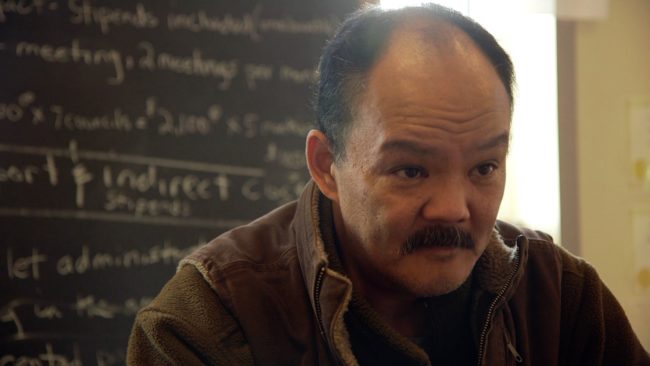
The village of Newtok has requested a federal disaster declaration from President Barack Obama to address ongoing erosion and thawing permafrost. It’s one of the first tests of whether the nation’s disaster relief laws can be used to deal with the slow-moving impacts of climate change.
Disaster declarations, which make a community eligible for federal funding, are usually reserved for specific catastrophic events — like a hurricane or landslide. But Newtok is applying for damage that has occurred through many smaller incidents over the last ten years. It’s a long shot, but village relocation coordinator Romy Cadiente said, at this point, the village doesn’t have a lot of options.
“We just need to get out of there,” Cadiente said. “We really do. For the safety of the 450 people there. We need to get out of there.”
Many Alaska villages are facing erosion and thawing permafrost made worse by warming temperatures, but Newtok’s needs are maybe the most immediate. The village has lost its barge landing, sewage lagoon and landfill. It expects to lose its current drinking water source this year, and the airport and school by 2020. More than half the homes in the village have been damaged by thawing permafrost. Six homes are at immediate risk from coastal erosion.
The community is ready to move: there’s a new site, with several houses already built. The major problem, Cadiente said, is money. Money for key and expensive infrastructure, like a new airstrip, school, and water source.
“The price tag on this village move is astronomical,” Cadiente said. “We’re thinking probably in the $150 to $300 million range. And what we have right now is nowhere near.”
And, after more than a decade of waiting, Newtok needs that money now.
Alaska had hoped to fund the relocation with a grant from the federal Department of Housing and Urban Development, but the state learned last winter it had been turned down. Officials cast about for another solution and settled on the Stafford Act. That’s the law that governs disaster relief, coordinated by the Federal Emergency Management Agency (FEMA).
The only problem? It’s never been used for a multi-year disaster before. That’s according to Newtok village attorney Mike Walleri and Erin Ward, of FEMA’s Region X office.
But Walleri argued nothing in the law prevents the president from declaring a disaster for a multi-year event like the thawing permafrost in Newtok.
“You know, disasters are not planned, and they don’t come in one size fits all,” Walleri said. “And FEMA over its life has, I think, understood that. And it’s tried to adapt to the changing circumstances of these disasters.”
Newtok is the first test of that theory.
Rob Verchick teaches at the Loyola University College of Law in New Orleans, where he focuses on disaster law and climate adaptation.
“This is a trailblazing effort that will definitely put problems like this on the radar screen for federal and state policy makers and make it impossible for the public, I hope, to avoid these kinds of discussions in the future,” Verchick said. “Because Newtok may be the first community to make such a request, but it is not the only community that’s experiencing these kinds of problems.”
Verchick said the request, whether it’s accepted or not, is a milestone.
“At the very least what this shows is we have a huge gap in our federal laws and in our federal planning, because there are lots of communities that are going to be facing this kind of a problem, many of them on the coast and many of them tribal communities,” Verchick said. “And we need some kind of a federal approach, some kind of a federal policy, to address concerns like these.”
As for Romy Cadiente – he’s just hoping the answer from the White House is yes.
The request is now under review by FEMA. Newtok is hoping to get an answer before the Obama administration leaves office on Jan. 20.
Rachel Waldholz covers energy and the environment for Alaska's Energy Desk, a collaboration between Alaska Public Media, KTOO in Juneau and KUCB in Unalaska. Before coming to Anchorage, she spent two years reporting for Raven Radio in Sitka. Rachel studied documentary production at the UC Berkeley Graduate School of Journalism, and her short film, A Confused War won several awards. Her work has appeared on Morning Edition, All Things Considered, and Marketplace, among other outlets.
rwaldholz (at) alaskapublic (dot) org | 907.550.8432 | About Rachel




